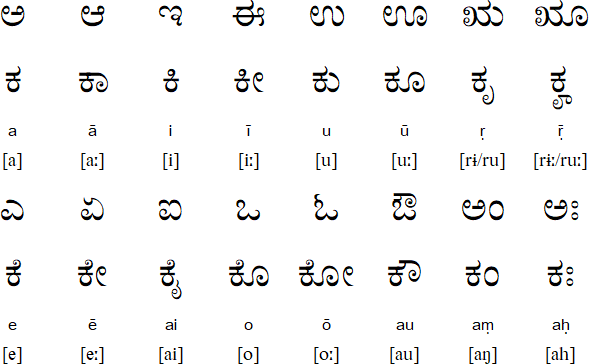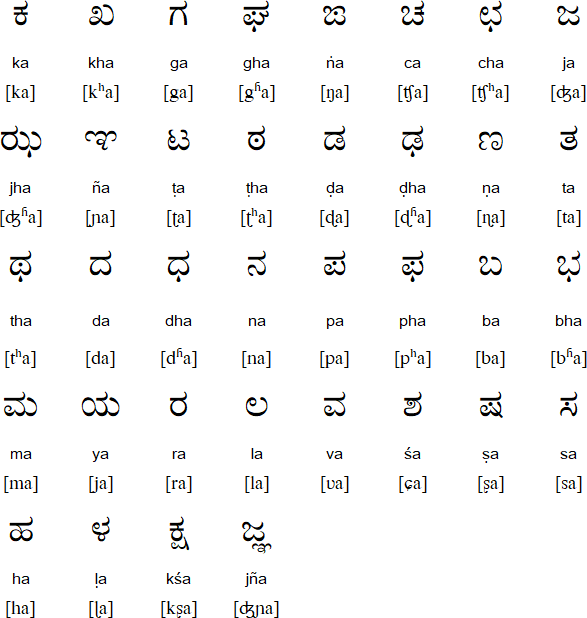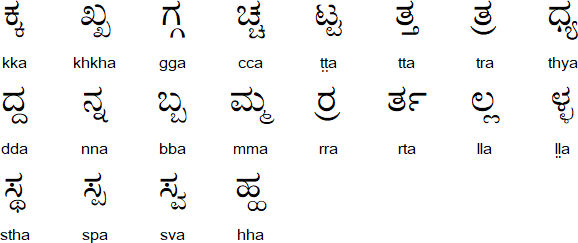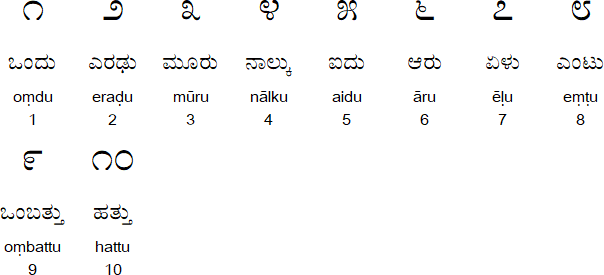Kannada is a Southern Dravidian language spoken mainly in the state of Karnataka in the southwest of India. There are also Kannada speakers in the Indian states of Andhra Pradesh, Maharashtra, Tamil Nadu, Telangana, Goa and Kerala, and in the USA, Singapore, Australia, New Zealand and Canada. In 2011 there were about 56.4 million speakers of Kannada, including 43 million native speakers.
Kannada is the official and administrative language of Karnataka, and was officially designated a classical language of India in 2011. It is also known as Banglori, Canarese, Havyaka or Kanarese.
Kannada first appeared in writing as words in Tamil inscriptions dating from the 3rd-1st centuries BC. The earliest known texts in Old Kannada were written in the Brahmi script and are dated at 450 AD. Poetry in Kannada started to appear in 700 AD, and literary works from 850 AD.
From the 14th century Kannada was sometimes written with the Tigalari alphabet, which developed in the 12th century in Karnataka.
The Kannada alphabet (ಕನ್ನಡ ಲಿಪಿ) developed from the Kadamba and Cālukya scripts, descendents of Brahmi, which were used between the 5th and 7th centuries AD. These scripts developed into the Old Kannada script, which by about 1500 had morphed into the Kannada and Telugu scripts. Under the influence of Christian missionary organizations, Kannada and Telugu scripts were standardized at the beginning of the 19th century.

Hear a recording of these letters by ಚೇತನ್ (Chethan)

A recording of these letters by ಚೇತನ್ (Chethan)


A recording of these numbers by ಚೇತನ್ (Chethan)
Download a chart of the Kannada alphabet (Excel)
How to write and pronounced Kannada letters

Ellā mānavarū svatantrarāgiyē janisiddāre. Hāgū ghanate mattu hakku gaḷalli samānarāgiddāre. Vivēka mattu antaḥkaraṇagaḷannu paḍedavarāddarinda avaru paraspara sahōdara bhāvadinda vartisabēku.
A recording of this text by ಚೇತನ್ (Chethan)
All human beings are born free and equal in dignity and rights. They are endowed with reason
and conscience and should act towards one another in a spirit of brotherhood.
(Article 1 of the Universal Declaration of Human Rights)
Thanks to Arvind Iyengar for providing the sample text.
Information about Kannada | Phrases | Numbers | Tower of Babel
Information about the Kannada language
http://en.wikipedia.org/wiki/Kannada
http://languages.iloveindia.com/kannada.html
http://www.indianetzone.com/7/kannada.htm
Information about the Kannada alphabet
http://en.wikipedia.org/wiki/Kannada_alphabet
Online Kannada lessons
http://www.universini.com
Kannada phrases
http://www.aboutlanguageschools.com/language/phrases/kannada.asp
http://www.mangalore.com/documents/languages.html
http://wikitravel.org/en/Kannada_phrasebook
http://www.languageshome.com/English-Kannada.htm
http://www.mediescapes.com/India_Useful_Phrases.html
Online Kannada dictionary
http://www.shabdkosh.com/kn/
http://dictionary.tamilcube.com/kannada-dictionary.aspx
http://kannada.changathi.com/Dictionary.aspx
Free Kannada fonts
http://www.wazu.jp/gallery/Fonts_Kannada.html
http://salrc.uchicago.edu/resources/fonts/available/kannada/
http://web.nickshanks.com/fonts/kannada/
http://kannada.changathi.com/Fonts.aspx
https://github.com/aravindavk/Gubbi
https://github.com/aravindavk/Navilu
Online news in Kannada
http://www.prajavani.net
http://www.kannadaprabha.com
https://publictv.in/
https://karnatakahelp.in/
https://www.vijayavani.net/
Kannada, Kodava, Konkani, Lambadi, Sankethi, Tulu
Badaga, Brahui, Dhundari, Gondi, Irula, Jatapu, Kannada, Kodava, Kolam, Konda, Koya, Kurukh, Malayalam, Malto, Mukha Dora, Ravula, Sankethi, Savara, Sunuwar, Suriyani Malayalam, Tamil, Telugu, Toda, Tulu, Yerukula
Ahom, Aima, Arleng, Badagu, Badlit, Basahan, Balinese, Balti-A, Balti-B, Batak, Baybayin, Bengali, Bhaiksuki, Bhujimol, Bilang-bilang, Bima, Blackfoot, Brahmi, Buhid, Burmese, Carrier, Chakma, Cham, Cree, Dehong Dai, Devanagari, Dham Lipi, Dhankari / Sirmauri, Ditema, Dives Akuru, Dogra, Ethiopic, Evēla Akuru, Fox, Fraser, Gond, Goykanadi, Grantha, Gujarati, Gunjala Gondi, Gupta, Gurmukhi, Halbi Lipi, Hanifi, Hanuno'o, Hočąk, Ibalnan, Incung, Inuktitut, Jaunsari Takri, Javanese, Kaithi, Kadamba, Kamarupi, Kannada, Kawi, Kharosthi, Khema, Khe Prih, Khmer, Khojki, Khudabadi, Kirat Rai, Kōchi, Kodava Lipi, Komering, Kulitan, Kurukh Banna, Lampung, Lanna, Lao, Lepcha, Limbu, Lontara/Makasar, Lota Ende, Magar Akkha, Mahajani, Malayalam, Meitei (Modern), Manpuri (Old), Marchen, Meetei Yelhou Mayek, Meroïtic, Masarm Gondi, Modi, Mon, Mongolian Horizontal Square Script, Multani, Nandinagari, Newa, New Tai Lue, Ojibwe, Odia, Ogan, Pahawh Hmong, Pallava, Phags-pa, Purva Licchavi, Qiang / Rma, Ranjana, Rejang (Kaganga), Sasak, Savara, Satera Jontal, Shan, Sharda, Sheek Bakrii Saphaloo, Siddham, Sinhala, Sorang Sompeng, Sourashtra, Soyombo, Sukhothai, Sundanese, Syloti Nagri, Tagbanwa, Tai Noi, Takri, Tamil, Tanchangya (Ka-Pat), Tani, Thaana, Telugu, Thai, Tibetan, Tigalari, Tikamuli, Tocharian, Tolong Siki, Vatteluttu, Warang Citi
Page last modified: 12.02.25
[top]
You can support this site by Buying Me A Coffee, and if you like what you see on this page, you can use the buttons below to share it with people you know.

If you like this site and find it useful, you can support it by making a donation via PayPal or Patreon, or by contributing in other ways. Omniglot is how I make my living.
Note: all links on this site to Amazon.com, Amazon.co.uk
and Amazon.fr
are affiliate links. This means I earn a commission if you click on any of them and buy something. So by clicking on these links you can help to support this site.
[top]